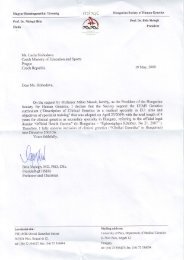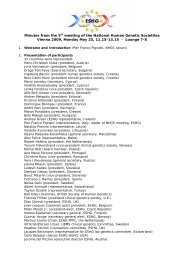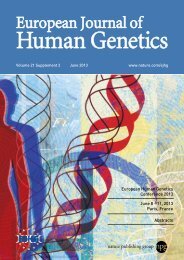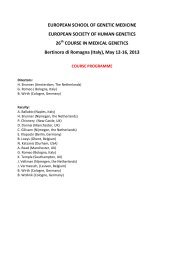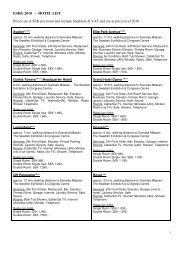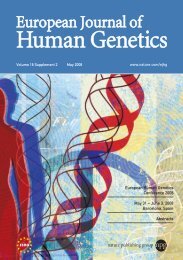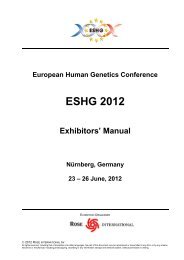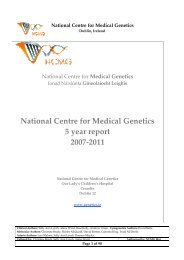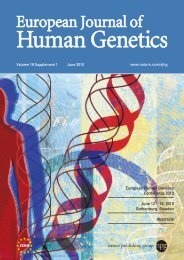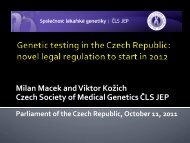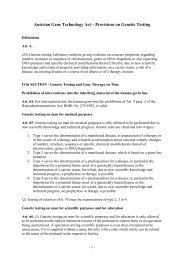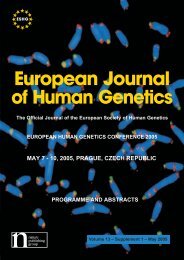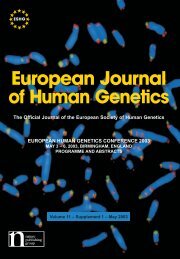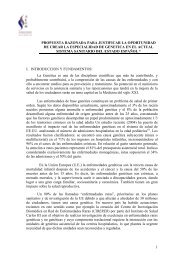2009 Vienna - European Society of Human Genetics
2009 Vienna - European Society of Human Genetics
2009 Vienna - European Society of Human Genetics
You also want an ePaper? Increase the reach of your titles
YUMPU automatically turns print PDFs into web optimized ePapers that Google loves.
Genetic counseling <strong>Genetics</strong> education, Genetic services, and Public policy<br />
P01.23<br />
incorporating genetics into primary care: Education as a tool<br />
for health care pr<strong>of</strong>essionals. the cAPABiLitY ARGENtiNA<br />
Demonstration Project<br />
C. Z. Barreiro 1 , U. Krist<strong>of</strong>fersson 2 , J. Schmidtke 3 , A. Kent 4 , A. L. Christianson 5 ,<br />
R. Raouf 6 , I. Nippert 7 ;<br />
1 Hospital de Pediatría Garrahan SAMIC, Buenos Aires, Argentina, 2 Lunds<br />
University, Lund, Sweden, 3 Medizinische Hochschule Hannover, Hannover,<br />
Germany, 4 Genetic Interest Group, London, United Kingdom, 5 University <strong>of</strong> the<br />
Witwatersrand, Johannesburg, South Africa, 6 Ministry <strong>of</strong> Health, Cairo, Egypt,<br />
7 Universitaetsklinikum Muenster, Muenster, Germany.<br />
Background: We present the preliminary results <strong>of</strong> the Demonstration<br />
Project <strong>of</strong> CAPABILITY in Chaco a Northeastern Argentine province.<br />
Chaco has a highly endogamic population and no genetic services<br />
were available. CAPABILITY is a 3-year Specific Support Action for the<br />
Network <strong>of</strong> Excellence EuroGentest (2007-<strong>2009</strong>).<br />
Objectives: The main objective <strong>of</strong> the Demonstration Project in Argentina<br />
is to enhance genetic services, using training <strong>of</strong> the health<br />
care team as a resource as well as to encourage the creation <strong>of</strong> complementary<br />
projects financed by Argentina to maintain the structure<br />
achieved and to reproduce the project in other areas <strong>of</strong> the country in<br />
correlation with Needs Assessment Argentina.<br />
Methods: We have designed a logical framework for the planning <strong>of</strong><br />
these processes, performed a diagnosis <strong>of</strong> the local situation, presented<br />
the project to the health authorities, set up a platform with teaching<br />
materials (PP presentation, printed syllabus, and CD) and a web<br />
page, chosen a zone for the pilot workshop and implemented it in April<br />
2008.<br />
Outcome: Through training primary health care pr<strong>of</strong>essionals who receive<br />
patients with congenital defects have learned how to detect risk<br />
factors and recognize dysmorphisms. The number <strong>of</strong> interconsultations<br />
in the period April-December 2008 increased significantly compared<br />
to the period April-December 2007. This increase has led to a<br />
further need for genetic services and the building <strong>of</strong> a Genetic laboratory<br />
in Chaco has been planned. We have ensured that the project will<br />
be funded by the Hospital Garrahan <strong>of</strong> Argentina.<br />
Funded by: EC Contract no.: FP6-037275<br />
P01.24<br />
the status <strong>of</strong> genetic information in health systems: a <strong>European</strong><br />
view<br />
A. Cambon Thomsen1 , S. Julia1,2 , A. Pigeon1 , E. Rial-Sebbag1 ;<br />
1 2 Inserm, U558 & University <strong>of</strong> Toulouse, Toulouse, France, Medical genetics<br />
department, University hospital Purpan, Toulouse, France.<br />
Genetic information can be considered as sensitive personal information<br />
or health information and is regulated as such in many health<br />
systems. In a number <strong>of</strong> cases its production and uses are specifically<br />
regulated by law or other kind <strong>of</strong> regulatory texts. There is a huge<br />
variability in the kind <strong>of</strong> regulations that apply to genetic information in<br />
<strong>European</strong> countries and we analyse the relevance and influence <strong>of</strong> supra-national<br />
texts in such regulations. The most recently adopted text<br />
on this topic is at the Council <strong>of</strong> Europe level, namely, the “Additional<br />
Protocol to the Convention on <strong>Human</strong> Rights and Biomedicine, concerning<br />
Genetic Testing for Health Purposes” Strasbourg, 2008 (http://<br />
conventions.coe.int/Treaty/en/Treaties/Html/203.htm); it specifies a<br />
number <strong>of</strong> points complementary to those addressed in the “Convention<br />
on <strong>Human</strong> Rights and Biomedicine” ,1997 (http://conventions.coe.<br />
int/treaty/EN/Treaties/Html/164.htm). We will analyse this document in<br />
relation to the situation in some chosen <strong>European</strong> countries (including<br />
France, Spain, Sweden), especially with regard to definitions used<br />
and principles applied, and with reference to the 25 recommendations<br />
published by the <strong>European</strong> Commission in 2004 (http://ec.europa.eu/<br />
research/conferences/2004/genetic/) following the work <strong>of</strong> an expert<br />
group on ethical, legal and social aspects <strong>of</strong> genetic testing. The focus<br />
will be on the issue <strong>of</strong> genetic exceptionalism, the place <strong>of</strong> genetic<br />
information in public health regulations and how direct to consumer<br />
<strong>of</strong>fers on internet may challenge the existing regulations. This is <strong>of</strong><br />
particular relevance as regard to the French situation where the law<br />
that regulates genetic testing is a “bioethics law” that is under revision<br />
in <strong>2009</strong>.<br />
P01.25<br />
A comparison study <strong>of</strong> the practices <strong>of</strong> genetic counsellors in<br />
EUROPE<br />
C. Cordier1,2,3 , M. Voelckel2,4 , H. Skirton5 ;<br />
1 2 Department <strong>of</strong> Cytogenetics, Mulhouse, France, French Association <strong>of</strong><br />
Genetic Counsellors, Marseille, France, 3CREGEMES, Strasbourg, France,<br />
4 5 Department <strong>of</strong> Medical <strong>Genetics</strong>, Marseille, France, University <strong>of</strong> Plymouth,<br />
Plymouth, United Kingdom.<br />
Genetic counsellors and genetic nurses are health pr<strong>of</strong>essionals with<br />
specialized training and experience in the areas <strong>of</strong> clinical genetics<br />
and counselling. They work as members <strong>of</strong> the multi-disciplinary<br />
healthcare team that provides genetic services.<br />
In most <strong>European</strong> countries, the pr<strong>of</strong>ession <strong>of</strong> genetic counsellor is<br />
relatively new and is not always recognized. The <strong>European</strong> Network<br />
<strong>of</strong> Genetic Nurses and Counsellors is working to establish standards<br />
<strong>of</strong> practice and education to support developments in the pr<strong>of</strong>ession in<br />
Europe. The aim <strong>of</strong> this survey was to collect baseline data on practice<br />
and education <strong>of</strong> genetic counsellors in <strong>European</strong> countries.<br />
Members <strong>of</strong> the Network were asked to respond to an electronic survey<br />
on the practice <strong>of</strong> genetic counselling in their own country. Data<br />
have now been collected from respondents from 13 countries.<br />
This survey indicates thet there are many differences in practice and<br />
training across Europe. There is no legal standing for the pr<strong>of</strong>ession<br />
in some countries, so that genetic counselling could be practiced by<br />
members <strong>of</strong> other pr<strong>of</strong>essions. The training may be provided in a hospital<br />
or university department <strong>of</strong> medicine, science or nursing. There<br />
are also marked differences in the types <strong>of</strong> clinical responsibilities undertaken.<br />
In some countries, the genetic counsellor can only undertake<br />
limited duties, such as pre-clinic contact, while in others he can<br />
work more autonomously, providing the full episode <strong>of</strong> care.<br />
These data will help to provide a foundation for further development<br />
in this pr<strong>of</strong>ession.<br />
P01.26<br />
the impact <strong>of</strong> current motivational behaviours on the future <strong>of</strong><br />
genetic medicine and research. A systematic literature review.<br />
B. S. Dhorajiwala, M. Keane, B. A. Jennings, A. Papageorgiou;<br />
The University <strong>of</strong> East Anglia, School <strong>of</strong> medicine, Health Policy and Practice,<br />
Norwich, Norfolk, United Kingdom.<br />
Background: Ambitious longitudinal studies, such as Biobank UK, rely<br />
on high volunteer recruitment rates. It is important for these studies,<br />
and for the subsequent application <strong>of</strong> genetic medicine, to understand<br />
motivational factors for the participants. Health behaviour models have<br />
been used to predict responses and explain attitudes about taking up<br />
healthcare.<br />
Method: We carried out a systematic review that aimed to evaluate<br />
all current evidence for motivation to participate in genetic testing<br />
and summarize the findings using thematic analysis, grouping results<br />
based on health behaviours. We completed a search <strong>of</strong> qualitative and<br />
quantitative literature from 1996 to December 2008. Relevant studies<br />
were identified from searches <strong>of</strong> AMED, EMBASE, MEDLINE, PsycINFO<br />
and CINAHL databases. 342 relevant articles were retrieved in<br />
abstract form, <strong>of</strong> which 18 were found to match our inclusion criteria for<br />
review and data extraction.<br />
Results: Analysis <strong>of</strong> the results encompassed multiple motivational factors<br />
for willingness to participate in genetic testing. Specific examples<br />
<strong>of</strong> grouped themes included:<br />
● Personal, social and family history as predictive factors to participate.<br />
● Perceived self-benefit from the development <strong>of</strong> knowledge and treatment<br />
<strong>of</strong> disease.<br />
● Perceived social benefit, aiding the understanding <strong>of</strong> the wider community.<br />
● Ability to understand terminology and education in genetic research<br />
as cues to action/participation.<br />
There is a great need for the further development <strong>of</strong> our<br />
understanding <strong>of</strong> what motivates individuals to participate<br />
in genetic testing. Understanding these underlying<br />
motivators can facilitate education, health promotion<br />
and enhance both participation in future genetic studies<br />
and the application <strong>of</strong> new technologies.



